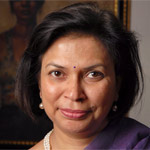Writing skills are critical to entering the PR leadership hierarchy: PR Guru
PR Guru
Welcome to this month's PR Guru where we ask what training skills are critical for PR professionals.
The wider PR Guru panel includes:
Kunal Kishore Sinha, founder director, Value 360 Communications Pvt. Ltd.
Gayatri Rath, director, corporate communications and citizenship, Microsoft India
Deepa Thomas, vice president, communications and CSR, Nissan Motor India
Paroma Roy Chowdhury, vice president, public affairs –SoftBank
Sujit Patil, vice president and head of corporate communications Godrej Industries Limited and Associate companies
Sonia Dhawan, DGM: marketing & PR at Paytm
Shravani Dang, vice president & global group head of corporate communications at the Avantha Group
Aniruddha Atul Bhagwat, co-founder & director, Ideosphere Consulting Private Limited.
Specifically, we'd like to thank Godrej’s Sujit Patil, Avantha’s Shravani Dang for stopping by this week.
Karishma Baghi, senior corporate communications professional, believes that the following skills are still missing in PR pros. The PR Guru panel weights in.
“Writing - one assumes to know this but writing a release, a white paper is an art!”
Expert Advice...
 Sujit Patil, vice president and head of corporate communications, Godrej Industries Limited and Associate companies
Sujit Patil, vice president and head of corporate communications, Godrej Industries Limited and Associate companies
“A single thought that upholds my belief in effective writing skills in today’s context is that PR is all about honest persuasion and one of the key pillars of effective persuasion is good writing. Having said that, PR itself has evolved and the diversity of PR with integration of earned, owned, paid media means there is no such thing as PR style of writing!
Writing in a particular manner is no longer a proof of PR excellence and that there are various other critical competencies that are necessary to ensure PR successes. I don’t mean to say that writing skills are no longer less essential for “on ground” PR jobs. In a talent starved industry, getting the ideal candidate with all-encompassing competencies may be a challenge. Assuming that the basic language hygiene factors are considered at recruitment stage, building effective contextual writing and articulating capabilities as a part of the training for fresher’s (and also for some seniors: -)) could be useful to raise the linguistic bar of our industry going forward.
A PR professional’s job is significantly done if he or she is able to evoke emotions, convey core messages and shape perceptions through any of the PR tools. PR folks would be seen as indispensable allies by the C-suite if they can master not just writing styles but know how to craft communication pieces that demonstrate transparency, clarity, content and impact.”
 Shravani Dang, vice president & global group head of corporate communications at the Avantha Group
Shravani Dang, vice president & global group head of corporate communications at the Avantha Group
“Good writing skills reflects clear thinking, critical thinking capability, the ability to articulate well and translate ideas and thoughts onto paper or speech. These are all elements which are equally critical to entering organisational leadership levels.”
Karishma Baghi, senior corporate communications professional, believes that the following skills are still missing in PR pros. The PR Guru panel weights in.
“Cross-cultural training - it’s probably the most important thing to know when working in a global team - managing relationships with a culture different to yours.”
Expert Advice...
 Sujit Patil, vice president and head of corporate communications, Godrej Industries Limited and Associate companies
Sujit Patil, vice president and head of corporate communications, Godrej Industries Limited and Associate companies
“I would call it cross cultural empathy. As part of 4 large M&A’s and having led a global team during a large re-branding program across four continents, during my Tata days, I would say it with full confidence; it is an absolute must! Business leaders have realized that intercultural understanding is indispensable. This is not just because there is a wave of internationalisation but also diversity within the nations is also becoming complex.
Cross cultural training dealing with behaviours can be an effective way of breaking the ice with international colleagues. These trainings can alert you on the differences which could be around culture, communication styles, values, etiquettes etc. (I would recommend “The Silent Language of Leaders” by my friend Carol Kinsey Goman, a book in which I along with a dozen communication professionals from across the world have discussed various cultural nuances). This is a vast subject but if I have to draw a word cloud that can sum it up, it would include words like; respect, empathy, letting go, verbal and non-verbal behaviours, values, attitudes, prejudices, feelings and identity.”
 Shravani Dang, vice president & global group head of corporate communications at the Avantha Group
Shravani Dang, vice president & global group head of corporate communications at the Avantha Group
“Absolutely and without a shadow of doubt! Cultural sensitivity is a must-have and cross cultural training is imperative.
In today’s increasingly globalized, digital and multicultural business world, there are virtual and on ground global teams across geographies and multiple time zones. It means that we have to successfully work with teams and other employees with varied and unique work practices, values and attitudes. It is also essential to build collaborative work relationships with teams and functional stakeholders. Certainly, a global mind-set which understands, appreciates and respects cultural sensitivities, diversity of expertise and ideas, is the key and will go a long way in turning distance and diversity into competitive advantage.
In a diverse nation like India, we also need cross cultural training as there are multiple regional and state nuances.”

If you enjoyed this article, you can subscribe for free to our weekly event and subscriber alerts.
Featured

PR professionals share their views on journalists publicly calling them out on story pitches

Auto blogger renders unconditional apology to Value 360 for defamatory posts

Hottest Indian startups of 2020, Paytm, Dreams 11 lead the charge: Wizikey Report




